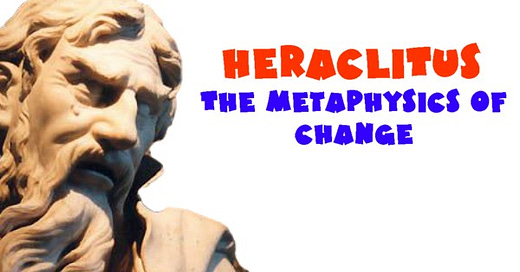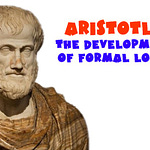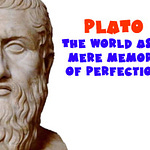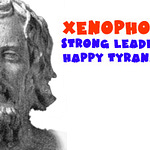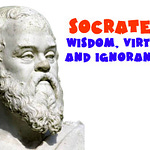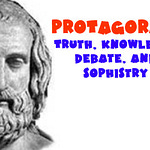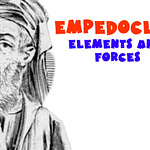Paid subscribers will have access to this and all other videos and bonus content. Please consider upgrading to a paid subscription to enjoy and support this project.
You can also obtain the benefits of a paid subscription by sharing Three Minute Philosophy with others. For each new friend you bring in, you earn benefits. So spread the word!
For the full archive of videos so far, visit https://www.speterdavis.com/philosophy/
Heraclitus of Ephesus was a Greek philosopher who lived in 500 BC approximately the same time and place as the Ionians, and was also concerned with a lot of the same subject matter.
However, he’s not typically considered part of the Ionian school of philosophy. He was a bit of a loner who claimed to be completely self taught, like one of those smart aleks who says he never went to college but learned everything he knows from YouTube videos.
But his philosophy was distinct enough from the ionians to be considered its own sort of thing. More than just trying to figure out what everything was made of objectively, Heraclitus was interested in the human experience of world.
Specifically, his focus was on the idea of change.
Heraclitus’ most famous saying was a man can never step into the same river twice. This saying is often misinterpreted though because Heraclitus wasn’t really saying that it’s a different river the second time you step into it, but he was making a point that you’re nevertheless stepping into different water.
What Heraclitus was investigating here was ontology—broadly speaking, the nature of being, or what it means to say that something is what it is.
For example when you talk about a river, you’re referring specifically to a body of water that’s moving, otherwise it’d be a lake or a pond or something. But how can something that’s always changing still be one thing?
Heraclitus thought the secret is that everything is kind of always changing and the one thing that’s constant about the universe is flux.
In the same way that the Ionian philosophers were concerned with finding the primary substance for all things, Heraclitus believed that the primary substance was fire.
Even though today we know that fire isn’t actually a substance at all, knowledge all has to begin somewhere.
The reason Heraclitus thought fire was so important was because of its constantly changing nature. And this idea isn’t all that silly when you imagine what Heraclitus was probably noticing was the way in which different substances are affected by temperature.
He thought for example that when wood bursts into flames and turns into smoke and air it’s because too much fire built up inside of it. After the fire is released it turns the wood into air which condenses in the atmosphere and turns into water, which is where rain comes from.
Of course this isn’t exactly how it works but you have to admit it isn’t that far removed from reality either. He was sort of on the right path to describing chemical reactions.
But rather than just look at the world separately from human beings, Heraclitus recognised that human beings are part of the world, which is something that should seem intuitive, but after all this time it’s strangely never really come up before now.
Heraclitus believed that the human soul was made of fire as well, and that’s why the body goes cold when you die.
But human observation and experience were above all key to Heraclitus’ theory of everything because with everything in constant flux you need a human point of view to pin down the nature of something.
Heraclitus called this the unity of opposites, and it attempted to explain how two contradictory things can be true at the same time depending on your point of view.
One of the examples he gave was that a road going up a hill and a road going down a hill are the same road. Even though they can’t be perceived in both ways at the same time. We can’t truly get a sense of the true essence of the road as a whole until we unify all the opposites.
Another example was the fact that seawater is both nurturing and destructive to life because you’d die if you drank it or drowned in it but fish rely on it for survival. Also the fact that an ass is completely ambivalent to jewellery but quite happy to dig through your garbage, which is really just an early version of the saying one man’s trash is another man’s treasure.
Heraclitus is usually considered one of the most influential of the pre-Socratic philosophers and considering he claimed to have come up with everything all on his own he had a pretty high opinion of himself, and generally a pretty low opinion of everyone else.
He thought that nobody else would be intelligent enough to understand anything he was talking about. And the funny thing is he wasn’t far from the truth. A century or so later, Plato and Aristotle tried to interpret Heraclitus’ philosophy and it’s generally accepted that they got it completely wrong.
As a result, for the next couple of thousand years up until relatively recently, Heraclitus philosophy was largely dismissed as a bunch of incoherent nonsense, like the Cheshire Cat, or Jordan Peterson.
It’s only over the past couple of centuries that scholars have started looking critically at his work itself rather than the misunderstood version repeated by later philosophers like Plato, and realised that it’s a lot more coherent and insightful than it was first given credit for.
So just remember the next time someone tells you that you’re talking nonsense it’s possible that your ideas might be much better appreciated two and a half millennia from now.
Sources:
Warren, James., Presocratics. Acumen, 2007
Adamson, Peter., Classical Philosophy: A history of philosophy without any gaps. Oxford University Press, 2014
Russell, Bertrand., A History of Western Philosophy. Simon & Schuster, 1945.
What you get for subscribing:
Three Minute Philosophy is a fun and educational series of videos and essays about the history of philosophy.
Essays are free. Paid subscribers will gain access to full videos, printable PDFs, and possibly more in time.
Listen to this episode with a 7-day free trial
Subscribe to Three Minute Philosophy to listen to this post and get 7 days of free access to the full post archives.


